Living in a temperate climate means everything changes constantly. But there are rhythms. Things change fastest in late August and early March, for example: the sun set after 8pm from early May until just three weeks ago, but last night, the sun set at 7:30; in two and a half weeks it sets at 7; three weeks after that, at 6:30.
So what prompted this nearly-inane observation? The insects. It's late evening and my windows are all open, so I can hear thousands of cicadas, grasshoppers, crickets—yes, even in the center of Chicago. And the spiders have come out by the hundreds, anywhere they can get two anchors and a cross-beam. While Parker and I sat at Ranalli's on Monday, two of them spun webs side by side in alternating gaps in the patio fence; there are four new webs on our back staircase in the last week.
To everything there is a season, at least above the 30th parallel.
No, not me; Gustav. The National Hurricane Center forecasts the storm pointing straight at the Louisiana coast by this time Monday. True, six days out the error bars are pretty far apart, but New Orleans is right in the center of them.
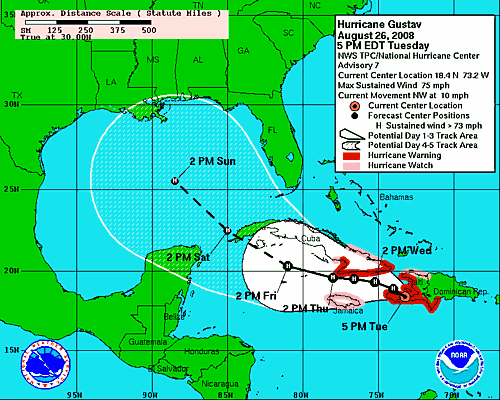
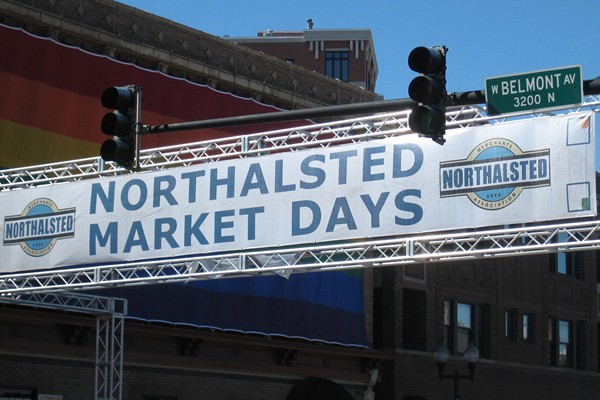 Parker and I checked out the annual festival in Boystown, and lasted 45 minutes before both of us suffered serious crowd fatigue. The walk did both of us some good, though my sunscreen, nowhere nearly as effective as the natural stuff he sheds all over the place, seems not to have lasted, so I'll definitely feel the walk longer than he will.
Parker and I checked out the annual festival in Boystown, and lasted 45 minutes before both of us suffered serious crowd fatigue. The walk did both of us some good, though my sunscreen, nowhere nearly as effective as the natural stuff he sheds all over the place, seems not to have lasted, so I'll definitely feel the walk longer than he will.
Crowds, though. My goodness. The weather was perfect today—I mean, perfect—so the entire city squeezed itself into four blocks of Halsted Street. Parker got his tail trod upon twice, patted on the head by perhaps a hundred people, and looked at me on the walk home as if to say, "how much farther to Bataan?" Poor guy.
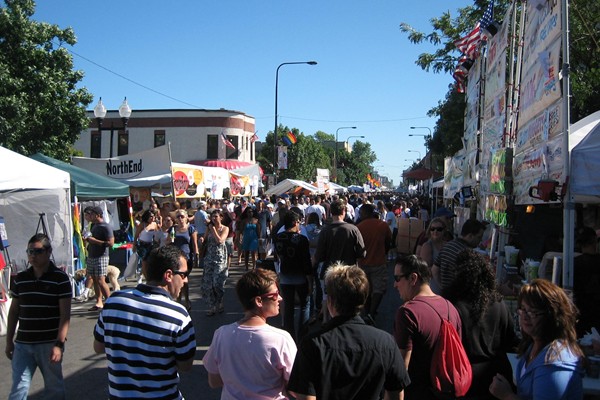
Also, I finished Small Gods, a literary amuse guele before tackling Howard Zinn's People's History of the U.S..
The Chicago Tribune had another write-up of Monday night's storm. Apparently, it produced unprecedented electrical activity:
Over four hours, about a half-year's worth of lightning bolts bombarded the Chicago area, electrifying the night sky as trees were split, transformers were zapped and houses were set ablaze.
As work crews picked up Tuesday from the previous night's storms, meteorologists were assessing the staggering power of a historic thunderstorm.
Nearly 90,000 thunderbolts had hit northern Illinois, according to the National Lightning Detection Network. At the storms' peak, it was firing off more than 800 bolts per minute; and that only counts those that hit the ground.
There's a write-up of last night's storms in the Trib:
Clean-up efforts were under way Tuesday morning after a line of severe thunderstorms moved through the Chicago area Monday night, downing trees and power lines, starting fires, peeling off roofs, briefly closing down both Chicago airports and ending a Cubs game after two rain delays.
As of 6:30 a.m. Tuesday, crews from the Chicago Department of Streets and Sanitation responded to reports of 1,104 damaged trees, 132 malfunctioning traffic signals, 55 damaged street light poles and 92 downed wires. The department said there were also 194 city blocks without working street lights.
...but only because I got to watch it from inside my apartment. A major squall drove through Chicago this evening with 90 km/h winds (including two small tornadoes) and dime-size hail reported. My neighbors across the street have lost power, too. We didn't, but the Inner Drive Technology International Data Center battery backups complained loudly through the worst of the storm.
It's gone now, which makes Parker happy for two reasons: he didn't enjoy the storm itself, and he really, really wanted to go outside.
Here's the radar image from Intellicast:
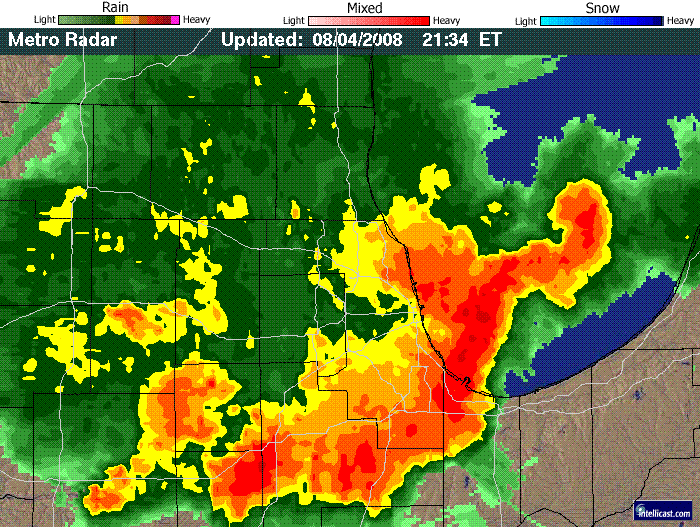
Since I went to the Philadelphia game two nights ago, a lot has happened—most of it in the last few hours:
So, I am aware of all these things, but the only purpose of this post is to put up photos from Philadelphia. First, city hall (which is becoming a trend in these posts):
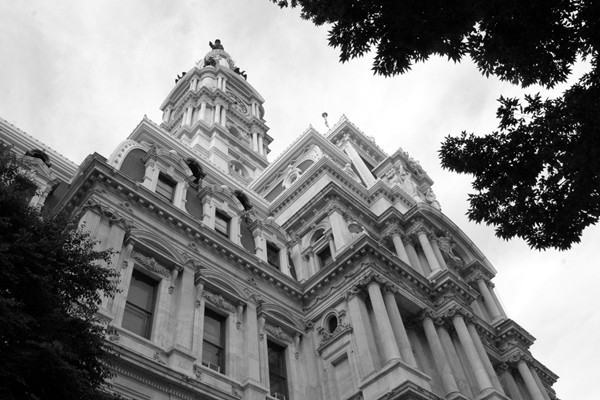
Citizens Bank Park:
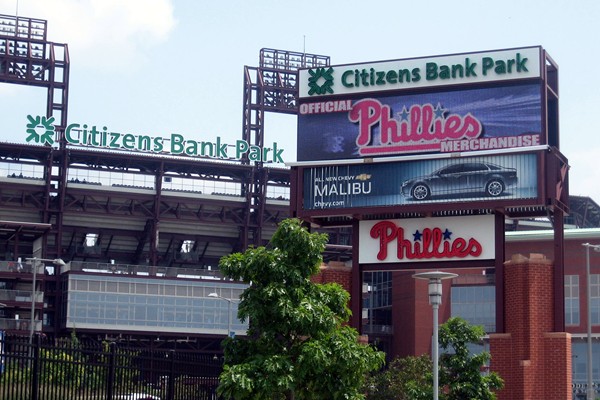
And this, which astute readers may recognize as the Noah's Flood bearing down on the city:
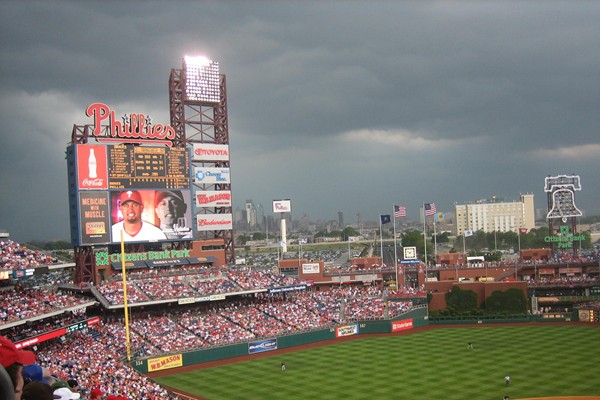
No kidding:
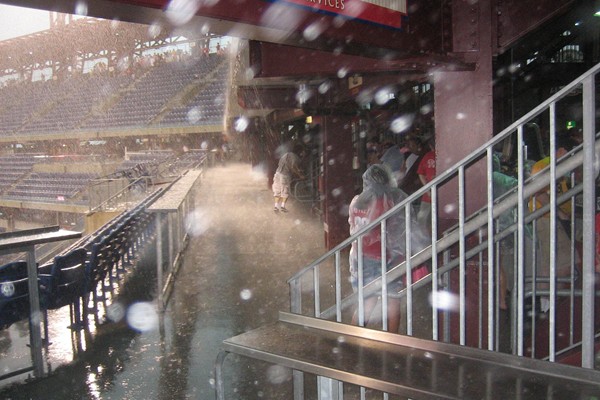
I will now dive into my photos from last night's game...
We get about 30 days a year like this in Chicago: 24°C, perfectly clear, light breeze. As much as I'd have preferred this weather yesterday (I had a flight scheduled but had to cancel because of low ceilings), today Parker and I took advantage of it and walked to Whole Foods. Round trip: 5 ½ km.
Actually, it's all about work. See, I've got a ton of work to do tomorrow, so this way, Parker is all pooped out and sleeps all day. So it's not about goofing off on a summer day, it's about hard work, which in turn is all about preparation.
Interesting juxtaposition of stories in the Chicago Tribune this morning. First, scientists have linked warm weather to kidney stones, implying that climate change will increase the number of reported cases in Chicago:
Linking climate change to kidney stones seems odd, but it's based on the solid medical finding that people in warm regions develop the condition at increased rates. Sweating in warm weather removes fluid from the body and increases the salt concentration in urine, which can spur the growth of kidney stones.
By the year 2050, the new report estimates that a large chunk of Illinois will fall within America's "kidney-stone belt," which currently includes only Southern states. The Chicago area alone would see up to 100,000 extra cases each year, according to the report published Monday in a widely respected journal, Proceedings of the National Academy of Sciences.
Then there's today's weather forecast, calling for actual summer weather:
Strings of 90-degree days—like those predicted here for the remainder of the workweek—have occurred in 98 percent of the city's summers since 1928. But, the first of them typically occurs on or about June 7. That makes the hot-weather period predicted to dominate the area almost five weeks late. As many as four consecutive 90-degree highs are likely to occur here by the end of the week, something that has occurred on 53 of the past 80 warm seasons—or nearly two-thirds of the time.
In other words, usually it's this hot earlier in the year, so be glad. Sort of.
I stopped to check email just now and found two odd things. I have the USGS earthquake feed on RSS. The USGS has deleted a number of 4.0+ magnitude earthquake reports tonight; it looks like fireworks are setting off the seismographs. But while I was laughing at that, I noticed a very real 7.6-magnitude earthquake near Kamchatka which, fortunately, does not appear to have caused a tsunami.
A 7.6 is a big deal. The earthquake that levelled San Francisco in 1906 was about an 7.8. No one appears to have been hurt today, which is fortunate.